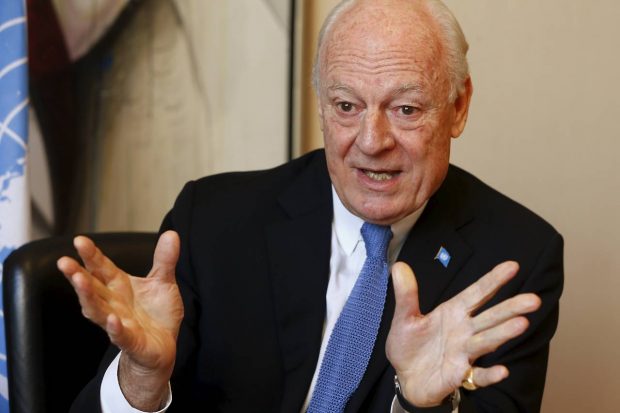Syria: Peace talks could see collapse, says UN delegate

The United Nations and key sponsors of the Syria peace talks are trying to salvage a cease-fire and make progress on issues of humanitarian relief to keep the deadlocked negotiations alive.
The U.N. envoy for Syria Staffan de Mistura, who is mediating the talks in Geneva, said Friday that they were in “great trouble.” Mr. de Mistura appealed to regional powers, as well as the U.S. and Russia, which brokered the truce at the end of February, to step in and save the process.
“It can definitely get back on track but it will require urgent effort because of what we have been witnessing over the past few days,” he said.
Mr. de Mistura said he would continue consultations through Wednesday.
He pointed out the main opposition delegation, known as the High Negotiations Committee, had left a small contingent in Geneva despite formally suspending its participation on Monday. The opposition has accused the regime of repeated violations of the cease-fire and denying humanitarian aid to besieged areas.
On Friday, at least 20 people, most of them civilians, were killed in regime airstrikes against rebel-held neighborhoods in the northern city of Aleppo, according to opposition activists. There was no immediate comment from the regime. On Tuesday, busy markets in opposition-held areas in the northwestern Idlib province were bombed, killing dozens of people, antigovernment activists and monitoring groups said.
The regime and its main ally Iran announced this month their intention to drive rebels out of Aleppo, with Russia’s backing. U.S. officials said they have seen a movement of Russian equipment and artillery in northern Syria.
Fighting also continued on other fronts including in the countryside around the central cities of Hama and Homs, and in the mountains of the northwestern province of Latakia. A week ago, rebels, in conjunction with hard-line Islamist groups opposed to the Geneva talks, launched multiple counteroffensives against regime positions.
In Paris, French Foreign Minister Jean-Marc Ayrault echoed Mr. de Mistura’s concerns about the cease-fire and the overall efforts to broker a political solution. He said the situation in Syria would be discussed at a meeting between President Barack Obama and his British, French, German and Italian counterparts Monday in Hannover, Germany.
“Today, the political negotiations have entered the danger zone,” he said during a news conference with the European Union foreign policy chief Federica Mogherini.
The latest round of Syria talks, which started 10 days ago, were supposed to pave the way for face-to face negotiations between the regime and the main opposition delegation over the shape and contours of a political transition to end the five-year war.
So far the talks have been called “proximity” negotiations, requiring Mr. de Mistura to meet separately with each delegation as the go-between.
The road map for peace in Syria, outlined in a U.N. Security Council resolution at the end of last year, calls for a transitional government acceptable to all sides to be in place by June. This government would draft a new constitution and hold new elections.
Mr. de Mistura urged the Syrian regime to allow basic medical and surgical supplies into the 15 out of 18 besieged areas that it and its allies were responsible for.
Earlier Friday, the regime listed its achievements on the humanitarian front, with the head of the delegation, Bashar al-Jaafari, accusing the West of “shedding crocodile tears” for the humanitarian situation while backing rebels whom he called “terrorists” with weapons.
Through the Geneva talks, the opposition has stuck to its position that a political solution in Syria begins with the departure of President Bashar al-Assad, or the transfer of all his powers to a transitional governing body.
The regime said the most it is willing to offer the opposition is a place in a unity government under Mr. Assad.
[su_note note_color=”#fefccb”]The views expressed in this article are the author’s own and do not necessarily reflect Libyan News’s editorial policy.[/su_note]
How to submit an Op-Ed: Libyan Express accepts opinion articles on a wide range of topics. Submissions may be sent to oped@libyanexpress.com. Please include ‘Op-Ed’ in the subject line.
- CBL devalues dinar by 13.3% against foreign currencies - April 07, 2025
- Libyan teen wins bronze for natural antibiotic discovery - April 07, 2025
- Tunisia begins major migrant camp clearance - April 05, 2025


